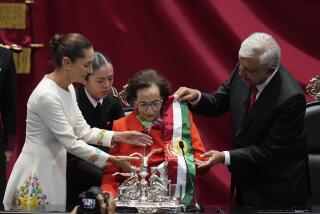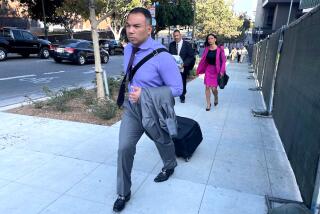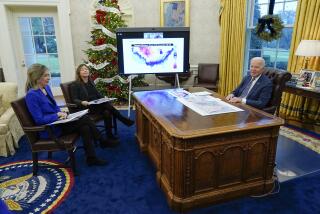Helen Chavez dies at 88; widow of civil rights leader Cesar Chavez
- Share via
Helen Chavez, the widow of Cesar Chavez, who aided the farmworkers union her husband founded by keeping the books, walking the picket line and being arrested – all while raising their eight children – died Monday at a Bakersfield hospital. She was 88.
A statement from the Cesar Chavez Foundation said she died of natural causes and was surrounded by family members.
Though notoriously reticent and uncomfortable with media attention, Chavez sometimes found herself in the spotlight alongside her husband, who led the United Farm Workers of America for 31 years. In 1978 she was arrested and convicted with her husband for picketing a cantaloupe field where workers were represented by the Teamsters Union.
------------
FOR THE RECORD
June 10, 2:15 p.m.: This obituary states that in 1978, when Helen and Cesar Chavez were arrested in Yuma, Ariz., over picketing a cantaloupe field, the Teamsters were representing workers at the site. The Teamsters were not involved in the episode, said Marc Grossman, Cesar Chavez Foundation spokesman, who was with the Chavezes at the time. The Associated Press reported the Teamster connection in a June 14, 1978, article about the protest and arrests, but several other experts also now question it. The Teamsters and United Farm Workers had signed a jurisdictional agreement in 1977, making it unlikely that the two unions would have faced off in Arizona a year later. Also, an earlier version of this article incorrectly included a picture of Dolores Huerta.
------------
Yet at the height of the movement, she remained in her husband’s shadow. She seemed to push past nervousness whenever she spoke publicly. “I want to see justice for the farmworkers,” she told a reporter for The Times in 1976. “I was a farmworker and I know what it is like to work in the fields.”
Her husband often traveled. Helen Chavez handled family life in his absence. She was considered a talented cook, capable of preparing meals for crowds, and “she absolutely held that family together,” said Miriam Pawel, a biographer of Cesar Chavez.
Though outwardly traditional, in private “she was not meek in any sense,” Pawel said. “People use the word ‘fierce’ to describe her. She had fierce eyebrows and was fiercely protective of her family.”
Born Helen Fabela in Brawley, Calif., on Jan. 21, 1928, Chavez began working in the fields when she was 14. The family lived in a converted horse barn outside McFarland, then moved to Delano, according to the foundation.
She met her future husband at an ice cream parlor in Delano in the early 1940s and the two married in 1948, eventually settling in East Los Angeles. Between 1949 and 1958, Chavez gave birth to eight children.
Their life together, she said, was “happy and exciting.” It was also spartan. Cesar Chavez, like others in the union, was paid $5 a week and expenses.
Helen Chavez helped sign up workers for the union, attended meetings, served as the union’s bookkeeper and then head of its credit union. In the early years, she also returned to work in the fields to help support the family.
In 1976 she made what The Times called her first public appearance alone.
“Mrs. Chavez stood under a walnut tree behind Mr. and Mrs. Gilbert Villaruel’s house in Huntington Park and shook hands with 150 supporters, all the while looking as if she wanted to bolt,” the paper reported.
In 1994, a year after her husband’s death, Chavez accepted the Medal of Freedom awarded to him by President Clinton. In 2003 she appeared at an event to celebrate a new stamp released in her husband’s honor
She is survived by seven of her children: Eloise Carillo, Paul Chavez, Sylvia Delgado, Anthony Chavez, Fernando Chavez, Anna Ybarra, Elizabeth Villarino and many grandchildren and great-grandchildren. Her daughter Linda Chavez Rodriguez died in 2000.
ALSO
Jurors vote for death sentence for ‘Grim Sleeper’ serial killer
Gov. Brown’s parole measure can go on November ballot, state Supreme Court rules
Father of former Stanford swimmer reportedly refers to sexual assault as ’20 minutes of action’
Stewart is a former Times staff writer.
More to Read
Sign up for Essential California
The most important California stories and recommendations in your inbox every morning.
You may occasionally receive promotional content from the Los Angeles Times.










